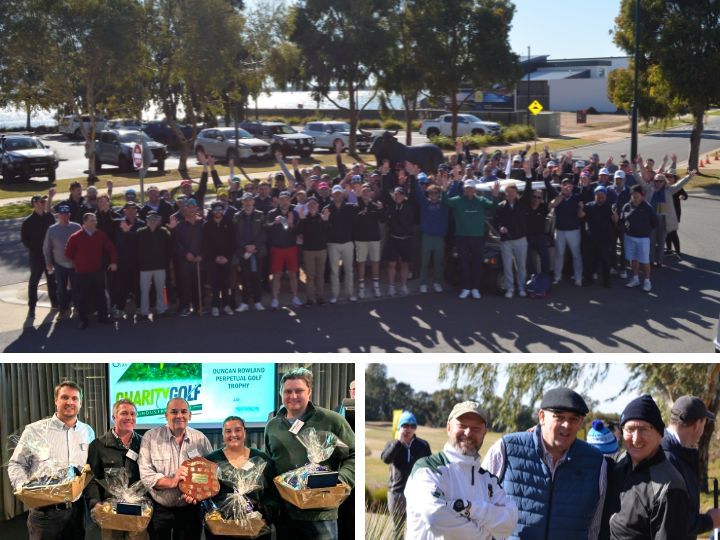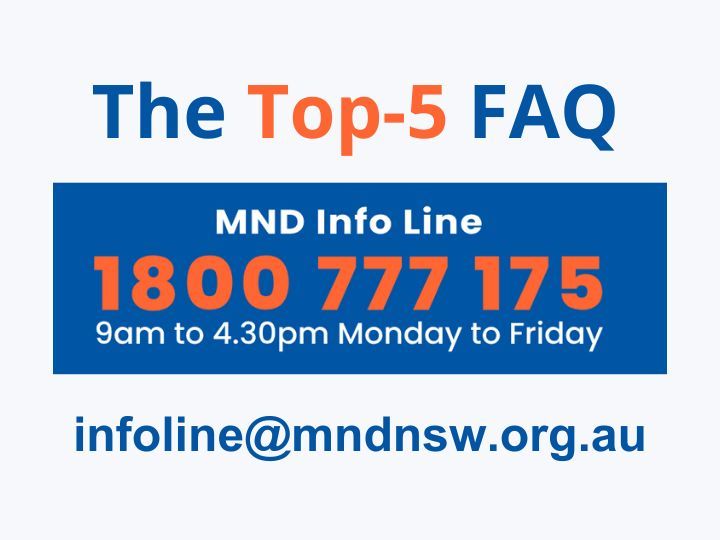September’s Top-5 feature questions about, how to maintain proper nutrition, when to consider palliative care, staying informed about research and managing and avoiding carer burnout.
We address these key concerns, offering guidance and support to help you to navigate your journey with MND.
1. How can I maintain nutrition as my swallowing becomes more difficult?
Some people who have been diagnosed with MND may experience swallowing difficulties as nerves and muscles around the face, mouth and throat weaken. It is important that strategies are implemented to assist in maintaining adequate nutrition.
Strategies include:
- Referral to a dietitian for assessment regarding nutrition intake, food and fluid consistency.
- Referral to a speech pathologist for assessment and monitoring of swallow and for advice regarding food and fluid consistency.
- Eating and drinking when well rested.
- Eating smaller meals more frequently
- Eat meals when there is no hurry or time restraints.
- Eat foods that are high in energy or nourishing meals.
For further information, visit:
- MND Aware Living with MND - Day-to-day - Page 30-31- MND NSW
- Communication and swallowing- MND NSW
- Dysphagia and Nutrition- MND Australia
2. When is the right time to link in with palliative care?
Despite misconceptions, palliative care is more than end of life care. It is a family-centre model of care that focuses on quality of life.
Eligibility and rules around accessing palliative care can differ across local health districts. It is recommended that you link with palliative care as soon as possible.
Palliative care can:
- Support with the management of MND symptoms.
- Provide medication and pain relief.
- Provide psychological, social, spiritual and practical support.
Palliative care can be provided by range of health and medical professionals which include GP, neurologists, allied health, community nurse or a specialised palliative care service.
If you have any questions regarding your local palliative care service, speak to your MND Advisor who can assist you to access and link into these services.
For further information, visit:
- MND Aware Living with MND - Aspects of care - Page 45- MND NSW
- End of Life Care: A guide for people living with MND
3. What is the difference between MND NSW, MND Australia and Fight MND?
MND NSW are the only organisation that provides support and equipment directly to people who are living with MND in NSW, ACT and the NT. FightMND do not provide direct support to people living with MND. FightMND raise funds for research and grants. MND Australia do not provide direct support to people living with MND. MND Australia invest in research and policy and provide information about MND
4. How can I keep up to date with research?
There are several resources where you can keep up to date with the latest MND research happening in Australia and across the world.
The resources include publications, updates and webinars.
- Advance: a newsletter published biannually providing information about the latest MND research.
- International Research Update: A quarterly update providing insight into the recent developments of MND research around the world.
- State of Play: a webinar series by MND Research Australia that provides an update on research advancements.
- International Alliance Scientific Advisory Council (SAC): this council produces a series of briefs that provide an update on the advances of MND research.
5. What is carer burnout and what are some strategies to prevent it?
Carer burnout is when a carer experiences physical, emotional and mental exhaustion. This can result in feelings of fatigue, anxiety and depression.
There are several strategies that can help reduce the risk of burnout, which include:
Joining the MND NSW Carer Program
Provides the opportunity to access a safe space to tell your story, be invited to events to support your need as a carer, learn about self-care, hear from professionals about MND and the caring role as well as being provided an opportunity to unwind by attending the Carers Kitchen Table Support Group Carer support - MND NSW.
Counselling
Services can be accessed privately or through the free phone service through Carer Gateway.
Self-care
Taking time for yourself whether that is through taking time off from caring, relaxation and remaining physically healthy.
For further information, visit:
Ask us a question!
Get in touch with us via 1800 777 175 or
Your question might be in our next month’s Top-5!




